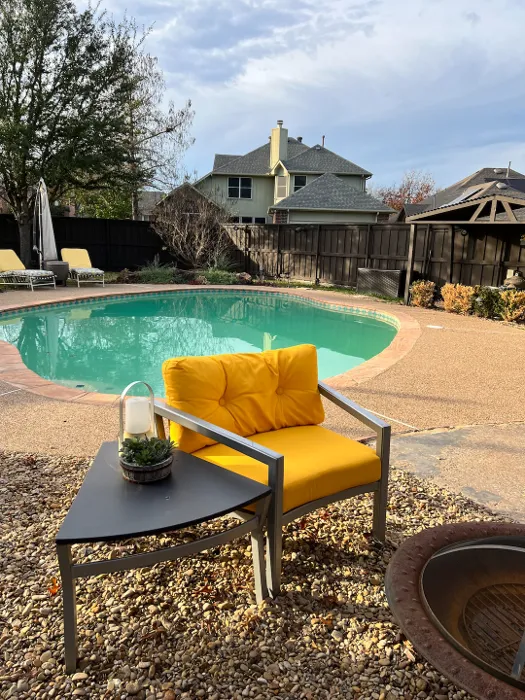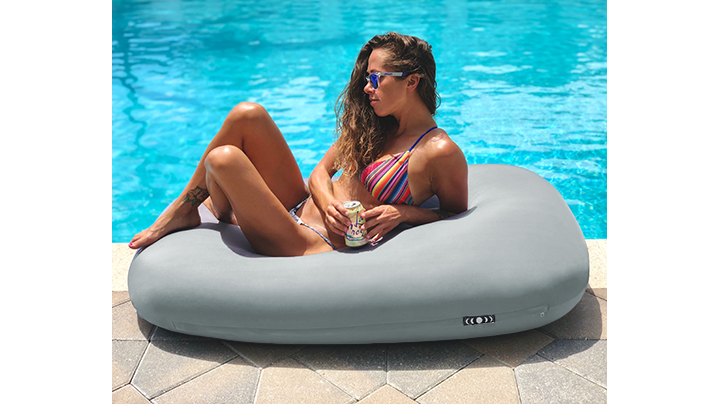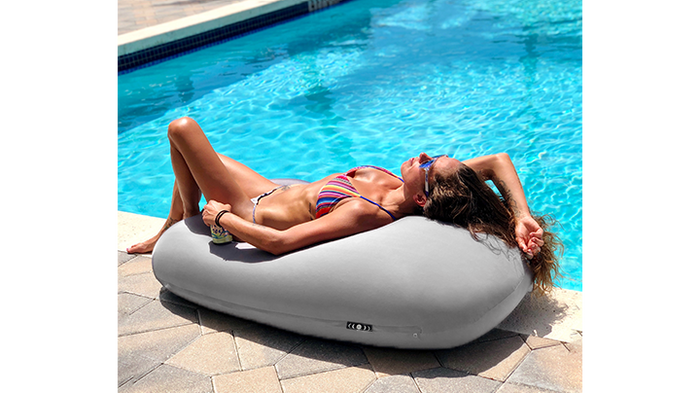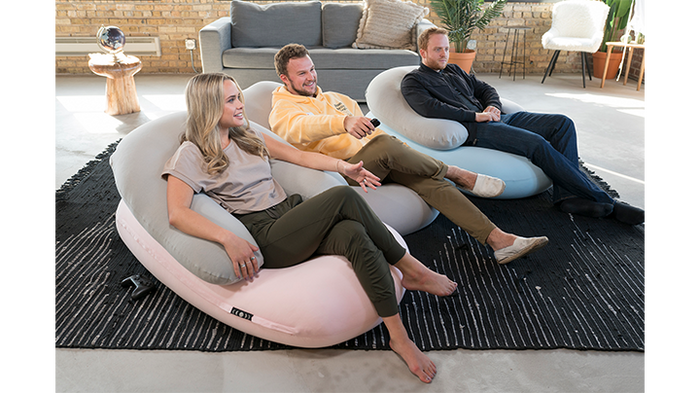71 BEST Tips Salt Water Pool Damaging Furniture (Facts)

-
Water Pool Damaging Furniture
-
Understanding Saltwater Pools
-
The Corrosive Nature of Saltwater
- Corrosion of Metal Furniture:
- Fading and Deterioration of Wood Furniture:
-
Protecting Your Furniture
-
FAQs (Frequently Asked Questions)
-
Related Posts:
-
-
Please note
-
Conclusion
Disclosure: Some of the links in this article may be affiliate links, which can provide compensation to me at no cost to you if you decide to purchase. This site is not intended to provide financial advice and is for entertainment only.
Water Pool Damaging Furniture
Saltwater pools have gained popularity in recent years due to their numerous benefits, including reduced chlorine levels and lower maintenance requirements.
However, it is important to understand that while saltwater pools offer many advantages, they can also have some unintended consequences.
One such consequence is the potential damage that saltwater can cause to outdoor furniture.
In this article, we will explore the various ways in which saltwater can negatively impact your furniture and discuss measures to mitigate or prevent this damage.
Understanding Saltwater Pools
Before delving into the effects of saltwater on furniture, let's briefly discuss how saltwater pools work.
Unlike traditional chlorine pools, saltwater pools use a salt chlorine generator (also known as a salt cell) to convert salt into chlorine.
This process eliminates the need for frequent manual addition of chlorine, making maintenance more convenient for pool owners.
Get this IDEAL Moon Pod super-fast!
Get more info about this Excellent Moon Pod!
The Corrosive Nature of Saltwater
Corrosion of Metal Furniture:
Saltwater contains high levels of dissolved salts, including chloride ions, which are known to accelerate the corrosion of metals.
When metal furniture is exposed to saltwater, these chloride ions can initiate a chemical reaction, leading to rust and corrosion.
Aluminum furniture, although generally resistant to corrosion, can still be affected by prolonged exposure to saltwater. The chloride ions can create pitting and etching on the surface, compromising the integrity of the furniture.
Stainless steel furniture, while more resistant to corrosion than other metals, is not completely immune. Chloride ions can degrade the passive layer that protects stainless steel, leading to pitting and staining.
Get this IDEAL Moon Pod super-fast!
Get more info about this Excellent Moon Pod!
Fading and Deterioration of Wood Furniture:
Saltwater can cause wood furniture to fade, lose its natural color, and even deteriorate over time. The salt content in the water can draw out moisture from the wood, causing it to become brittle and prone to cracking.
Additionally, the constant exposure to saltwater can break down the protective sealants and finishes on wood furniture, making it more vulnerable to damage from UV rays and other environmental factors.
Protecting Your Furniture
While the corrosive nature of saltwater is a concern, there are steps you can take to protect your outdoor furniture from damage. Here are some effective measures:
Choose the Right Materials:
Opt for furniture made from materials that are resistant to corrosion and fading. Stainless steel, teak, and certain types of synthetic wicker are excellent choices for saltwater environments.
Avoid furniture made from iron or regular steel, as they are highly susceptible to corrosion in saltwater pools.
Get this IDEAL Moon Pod super-fast!
Get more info about this Excellent Moon Pod!
Apply Protective Coatings:
Consider applying a protective coating to metal furniture to create an additional barrier against saltwater corrosion. Clear lacquers, epoxy coatings, and powder coatings can offer effective protection.
For wood furniture, apply a high-quality sealant or outdoor-rated varnish to enhance its resistance to saltwater damage.
>> For those interested in learning about the maintenance and benefits of salt water pools, our comprehensive guide titled 8129 BEST Tips on Salt Water Pool (Know-How Bank) provides in-depth insights.
It's a must-read for anyone considering the switch from a traditional chlorine pool. >>
Rinse and Dry:
After each use, rinse off your furniture with freshwater to remove any residual salt. This will help prevent salt buildup and minimize the potential for damage.
Ensure your furniture is adequately dried after rinsing to avoid prolonged exposure to moisture, which can exacerbate the effects of saltwater.
Get other OUTSTANDING products from Moon Pod Miracles Company!
Get SPECIAL offers. Get special DISCOUNTS!
Use Furniture Covers:
When your saltwater pool is not in use, consider covering your outdoor furniture with protective covers. This will shield it from direct exposure to saltwater and other environmental elements.
Regular Maintenance:
Regularly inspect your furniture for signs of corrosion or damage. Address any issues promptly to prevent further deterioration.
Clean and maintain your furniture according to the manufacturer's guidelines to ensure its longevity in a saltwater pool environment.
FAQs (Frequently Asked Questions)
Q: Can salt water pools damage outdoor furniture?
A: Yes, saltwater pools can potentially damage outdoor furniture if proper precautions are not taken.
Q: What kind of damage can saltwater cause to furniture?
A: Saltwater can cause corrosion, rust, fading, and deterioration of various types of furniture materials.
Q: How does saltwater cause corrosion in furniture?
A: Saltwater contains chloride ions that accelerate the corrosion process, especially on metal surfaces.
Q: What types of furniture are most susceptible to damage from saltwater?
A: Metal furniture, particularly aluminum and stainless steel, are more vulnerable to saltwater damage.
Get other OUTSTANDING products from Moon Pod Miracles Company!
Get SPECIAL offers. Get special DISCOUNTS!
Q: Is there a risk of saltwater damaging wood furniture?
A: Yes, prolonged exposure to saltwater can lead to fading, loss of color, and deterioration of wood furniture.
Q: Can saltwater cause pitting or etching on furniture surfaces?
A: Yes, chloride ions in saltwater can cause pitting and etching on metal furniture surfaces.
Q: What steps can I take to protect my furniture from saltwater damage?
A: Choosing the right materials, applying protective coatings, rinsing and drying furniture, using covers, and regular maintenance can help prevent saltwater damage.
Q: Which materials are best for saltwater pool environments?
A: Materials such as stainless steel, teak, and certain synthetic wickers are more resistant to saltwater damage.
Q: Are there specific coatings that can protect furniture from saltwater damage?
A: Clear lacquers, epoxy coatings, and powder coatings can provide additional protection to metal furniture against saltwater corrosion.
Q: How often should I rinse my furniture after exposure to saltwater?
A: It is recommended to rinse your furniture with freshwater after each use to remove any residual salt.
Q: Can furniture covers help protect against saltwater damage?
A: Yes, using furniture covers when not in use can provide an extra layer of protection against saltwater and other environmental elements.
Q: Is regular maintenance necessary to prevent saltwater damage?
A: Yes, regularly inspecting and maintaining your furniture according to manufacturer guidelines can help prolong its lifespan in a saltwater pool environment.
Q: Can I use any type of furniture in a saltwater pool?
A: It is essential to choose furniture specifically designed for outdoor and saltwater environments to minimize the risk of damage.
Get this IDEAL Crescent super-fast!
Get more info about this Excellent Crescent!
Q: Will applying a sealant or varnish protect wood furniture from saltwater damage?
A: Yes, a high-quality sealant or outdoor-rated varnish can enhance the resistance of wood furniture to saltwater damage.
Q: Can saltwater damage cushions and fabric on outdoor furniture?
A: Yes, prolonged exposure to saltwater can cause fading, deterioration, and discoloration of cushions and fabric on outdoor furniture.
Q: Are there specific cleaning products recommended for saltwater-damaged furniture?
A: It is best to follow the manufacturer's recommendations for cleaning products suitable for specific furniture materials.
Q: Does the saltwater pool's salt level impact furniture damage?
A: Higher salt levels in the pool may increase the risk of saltwater damage to furniture.
Q: Can I use regular steel furniture in a saltwater pool environment?
A: Regular steel furniture is highly susceptible to corrosion in saltwater pools and should be avoided.
Q: How can I prevent saltwater from seeping into furniture joints and crevices?
A: Applying protective coatings and regularly inspecting furniture for potential areas of saltwater entry can help prevent damage.
Q: Can saltwater damage furniture cushions even if they are removable and washable?
A: Yes, saltwater can still cause damage to removable and washable cushions over time.
Q: Is it necessary to rinse furniture with freshwater even if it is designed for a saltwater pool?
A: Yes, rinsing furniture with freshwater helps remove any residual salt and minimize the risk of damage.
Q: Can saltwater damage outdoor furniture that is not directly in the pool area?
A: Saltwater can carry through the air and affect outdoor furniture located near a saltwater pool.
Q: Are there any specific brands or types of outdoor furniture recommended for saltwater pools?
A: Researching and selecting furniture brands specifically designed for saltwater environments can help ensure better resistance to damage.
Q: Can I use regular chlorine in a saltwater pool to prevent furniture damage?
A: No, adding regular chlorine to a saltwater pool can disrupt the balance and may still lead to furniture damage.
Q: Will using a saltwater chlorinator at a lower level minimize furniture damage?
A: Using a saltwater chlorinator at the recommended level can help maintain proper water balance and potentially reduce furniture damage.
Q: Can saltwater pools damage outdoor furniture?
A: Yes, saltwater pools can potentially damage outdoor furniture if proper precautions are not taken.
Q: What kind of damage can saltwater cause to furniture?
A: Saltwater can cause corrosion, rust, fading, and deterioration of various types of furniture materials.
Q: How does saltwater cause corrosion in furniture?
A: Saltwater contains chloride ions that accelerate the corrosion process, especially on metal surfaces.
Q: What types of furniture are most susceptible to damage from saltwater?
A: Metal furniture, particularly aluminum and stainless steel, are more vulnerable to saltwater damage.
>> For further exploration on the impact of salt water pools on skin health, our article, 59 BEST Tips Is Salt Water Pool Healthy For My Skin (Facts), dives into the science behind it.
This piece offers essential information to those seeking a deeper understanding of how salt water pool usage can influence skin health. >>
Q: Is there a risk of saltwater damaging wood furniture?
A: Yes, prolonged exposure to saltwater can lead to fading, loss of color, and deterioration of wood furniture.
Q: Can saltwater cause pitting or etching on furniture surfaces?
A: Yes, chloride ions in saltwater can cause pitting and etching on metal furniture surfaces.
Q: What steps can I take to protect my furniture from saltwater damage?
A: Choosing the right materials, applying protective coatings, rinsing and drying furniture, using covers, and regular maintenance can help prevent saltwater damage.
Q: Which materials are best for saltwater pool environments?
A: Materials such as stainless steel, teak, and certain synthetic wickers are more resistant to saltwater damage.
>> In maintaining your pool area, understanding the potential effects of salt water on your deck is crucial.
Discover more in our detailed guide on the 63 BEST Tips on Salt Water Pool Damaging Decks (Facts).
Learn the facts, protect your deck, and ensure a safe, beautiful pool environment for years to come. >>
Q: Are there specific coatings that can protect furniture from saltwater damage?
A: Clear lacquers, epoxy coatings, and powder coatings can provide additional protection to metal furniture against saltwater corrosion.
Q: How often should I rinse my furniture after exposure to saltwater?
A: It is recommended to rinse your furniture with freshwater after each use to remove any residual salt.
Q: Can furniture covers help protect against saltwater damage?
A: Yes, using furniture covers when not in use can provide an extra layer of protection against saltwater and other environmental elements.
Q: Is regular maintenance necessary to prevent saltwater damage?
A: Yes, regularly inspecting and maintaining your furniture according to manufacturer guidelines can help prolong its lifespan in a saltwater pool environment.
Q: Can I use any type of furniture in a saltwater pool?
A: It is essential to choose furniture specifically designed for outdoor and saltwater environments to minimize the risk of damage.
Q: Will applying a sealant or varnish protect wood furniture from saltwater damage?
A: Yes, a high-quality sealant or outdoor-rated varnish can enhance the resistance of wood furniture to saltwater damage.
Q: Can saltwater damage cushions and fabric on outdoor furniture?
A: Yes, prolonged exposure to saltwater can cause fading, deterioration, and discoloration of cushions and fabric on outdoor furniture.
Q: Are there specific cleaning products recommended for saltwater-damaged furniture?
A: It is best to follow the manufacturer's recommendations for cleaning products suitable for specific furniture materials.
>> For individuals intrigued by the appeal of salt water pools and wondering about their worth, our comprehensive article, 81 BEST Tips Why Worth to Have Salt Water Pool (Facts), thoroughly discusses the advantages of these pool types.
This informative piece delves into the cost-effectiveness, health benefits, and overall convenience of owning a salt water pool, making it an ideal read for those contemplating this eco-friendly pool option. >>
Q: Does the saltwater pool's salt level impact furniture damage?
A: Higher salt levels in the pool may increase the risk of saltwater damage to furniture.
Q: Can I use regular steel furniture in a saltwater pool environment?
A: Regular steel furniture is highly susceptible to corrosion in saltwater pools and should be avoided.
Q: How can I prevent saltwater from seeping into furniture joints and crevices?
A: Applying protective coatings and regularly inspecting furniture for potential areas of saltwater entry can help prevent damage.
Q: Can saltwater damage furniture cushions even if they are removable and washable?
A: Yes, saltwater can still cause damage to removable and washable cushions over time.
Q: Is it necessary to rinse furniture with freshwater even if it is designed for a saltwater pool?
A: Yes, rinsing furniture with freshwater helps remove any residual salt and minimize the risk of damage.
Q: Can saltwater damage outdoor furniture that is not directly in the pool area?
A: Saltwater can carry through the air and affect outdoor furniture located near a saltwater pool.
Q: Are there any specific brands or types of outdoor furniture recommended for saltwater pools?
A: Researching and selecting furniture brands specifically designed for saltwater environments can help ensure better resistance to damage.
Q: Can I use regular chlorine in a saltwater pool to prevent furniture damage?
A: No, adding regular chlorine to a saltwater pool can disrupt the balance and may still lead to furniture damage.
Q: Will using a saltwater chlorinator at a lower level minimize furniture damage?
A: Using a saltwater chlorinator at the recommended level can help maintain proper water balance and potentially reduce furniture damage.
Related Posts:
73 BEST Tips Keep Pool Water Clean With Salt (Facts)
8129 BEST Tips on Salt Water Pool (Know-How Bank)
Please note
This https://kewmedia.com/ website (the “Blog”) is published and provided for informational and entertainment purposes only.
The information in the Blog constitutes the content creator’s own opinions (and any guest bloggers posting from time to time) and it should not be regarded as a description of any services provided by any company.
When it comes to matters of health, always consult with a trained medical professional – never rely solely on digital information. Taking into account your individual situation will help you make the best decisions for your own wellbeing.
The Blog serves as an informative resource, but should never be used to diagnose or treat a medical condition. When it comes to your health, always consult with a qualified doctor for the best advice and care tailored specifically for you!
The Blog and the materials and information it contains are not intended to, and do not constitute, medical or other health advice or diagnosis and should not be used as such. You should always consult with a qualified physician or health professional about your specific circumstances.
Also the opinions expressed in the Blog are for general informational purposes only and are not intended to provide specific advice or recommendations for any individual or on any specific security or investment product or loan, loans, credit, insurance or any other financial product or transaction. It is only intended to provide education about the financial industry. The views reflected in the commentary are subject to change at any time without notice.
Nothing on this Blog constitutes investment advice, performance data or any recommendation that any security, portfolio of securities, investment product, transaction or investment strategy, loan, loans, credit, insurance or any other financial instrument or transaction is suitable for any specific person.
From reading this Blog we cannot assess anything about your personal circumstances, your finances, or your goals and objectives, all of which are unique to you, so any opinions or information contained on this Blog are just that – an opinion or information.
You should not use this Blog to make financial decisions and we highly recommend you seek professional advice from someone who is authorized to provide investment advice.
Any indices referenced for comparison are unmanaged and cannot be invested into directly. Investments in securities involve the risk of loss. Past performance is no guarantee of future results.
This Blog contains links to other websites (which may include message boards or forums). We are not responsible for the privacy practices or the content of such sites. Please understand that any information that is disclosed in these areas becomes public information. We have no control over its use and you should exercise caution when deciding to disclose your personal information.
Conclusion
Saltwater pools offer many advantages, but it is crucial to be aware of the potential damage they can cause to outdoor furniture.
By understanding the corrosive nature of saltwater and implementing preventive measures, you can enjoy the benefits of a saltwater pool without compromising the lifespan and beauty of your furniture.
Choose the right materials, apply protective coatings, rinse and dry your furniture regularly, use covers when necessary, and maintain your furniture diligently.
With these precautions in place, you can create a harmonious outdoor space that thrives alongside your saltwater pool.
-
Water Pool Damaging Furniture
-
Understanding Saltwater Pools
-
The Corrosive Nature of Saltwater
- Corrosion of Metal Furniture:
- Fading and Deterioration of Wood Furniture:
-
Protecting Your Furniture
-
FAQs (Frequently Asked Questions)
-
Related Posts:
-
-
Please note
-
Conclusion
Disclosure: Some of the links in this article may be affiliate links, which can provide compensation to me at no cost to you if you decide to purchase. This site is not intended to provide financial advice and is for entertainment only.






